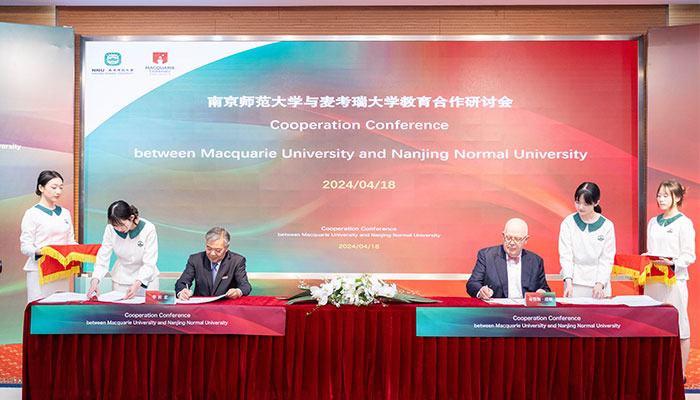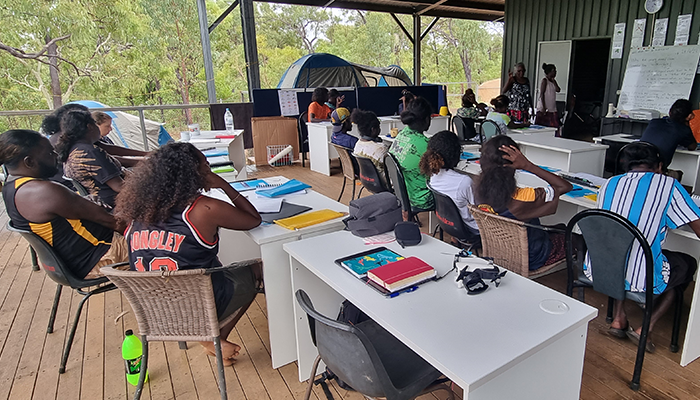New research into understanding how the brain adapts and improves its hearing abilities through the use of hearing technologies could play an important role in the future management of dementia.
The use of devices such as hearing aids and cochlear implants to delay and/or reverse cognitive decline in conditions such as dementia is one of the topics to be discussed at the XXXII World Congress of Audiology’s Roundtable on Central Auditory Plasticity.
Roundtable speaker Distinguished Professor Stephen Crain (Macquarie University) describes central auditory plasticity as the adaptability of the brain’s cerebral cortex to process sound more effectively in response to new stimuli.
"We now know the brain has a remarkable ability to regrow and adapt itself to process new kinds of information and relearn tasks, especially in early childhood, but across the lifespan," Prof Crain explained.
"Some of the best evidence for this comes from a brain imaging technique known as MEG (Magnetoencephalography) which measures tiny magnetic fields that are activated throughout our brains whenever we process information. Through MEG, researchers have been able to gain a better understanding of which areas of our brains are used to process certain kinds of information, including language. An example of one of the biggest discoveries made using brain imaging was learning that blind subjects process auditory information in both the brain’s visual and auditory cortex."
The peak of brain’s central auditory plasticity occurs in children between the ages of two and four. It’s before this critical time that infants with hearing loss benefit most from being fitted with a hearing device so that the regions of the brain that processes sound information and language can develop most optimally.
"Studies clearly show that children with hearing loss fitted with hearing devices at a young age achieve better language skills as compared to unfitted children with hearing loss and even children who are fitted later with these devices," Professor Crain stated.
"Although the brain has its greatest plasticity in very young children, it continues to have remarkable adaptive abilities at all ages. Our research at the ARC Centre of Excellence in Cognition and its Disorders in conjunction with the HEARing Cooperative Research Centre is using MEG to better understand how both child and adult brains process and adapt to the sound information received from cochlear implants and hearing aids."
Preliminary research supports the notion that adults with hearing aids develop new neural pathways in the brain to more fully utilise the information created by these devices. To some extent this conclusion is supported by anecdotal evidence that many adults who are initially unhappy with their hearing devices suddenly report dramatic improvement a month or so later.
"We don’t know yet exactly what is happening in the brains of these adults, but their observations suggest that perceptual processing changes are taking place in the brain as it adjusts to the information provided by hearing devices," Professor Crain explained.
"It’s early days but as the degree of hearing loss is highly correlated with the risk of dementia it seems highly likely that intervention with a hearing device to restore hearing in adulthood could assist in delaying the onset of dementia."
Dementia is the single greatest cause of disability in older Australians and is expected to affect almost 900,000 people by 2050.
Hearing and the Brain: symposium on translating research into practice
Following the World Congress of Audiology, an additional satellite symposium at the Australian Hearing Hub aims to provide clinicians and researchers in fields of audiology, gerontology and cognitive science with current information of the interaction between aging, cognition and hearing loss. International experts in this field will present their research and then engage in a panel discussion which will consider what further information is needed and what is the pathway to translation.
Friday 9 May, 2014, 9am – 4pm
Australian Hearing Hub
Level 1, 16 University Avenue,
Macquarie University
For further information including media interviews please contact: Greg Lawrence, XXXII World Congress of Audiology Media Manager. E: glawrence@hearingcrc.org, T: (07) 3308 3183 Mob: +61 431 426 623
The use of devices such as hearing aids and cochlear implants to delay and/or reverse cognitive decline in conditions such as dementia is one of the topics to be discussed at the XXXII World Congress of Audiology’s Roundtable on Central Auditory Plasticity.
Roundtable speaker Distinguished Professor Stephen Crain (Macquarie University) describes central auditory plasticity as the adaptability of the brain’s cerebral cortex to process sound more effectively in response to new stimuli.
"We now know the brain has a remarkable ability to regrow and adapt itself to process new kinds of information and relearn tasks, especially in early childhood, but across the lifespan," Prof Crain explained.
"Some of the best evidence for this comes from a brain imaging technique known as MEG (Magnetoencephalography) which measures tiny magnetic fields that are activated throughout our brains whenever we process information. Through MEG, researchers have been able to gain a better understanding of which areas of our brains are used to process certain kinds of information, including language. An example of one of the biggest discoveries made using brain imaging was learning that blind subjects process auditory information in both the brain’s visual and auditory cortex."
The peak of brain’s central auditory plasticity occurs in children between the ages of two and four. It’s before this critical time that infants with hearing loss benefit most from being fitted with a hearing device so that the regions of the brain that processes sound information and language can develop most optimally.
"Studies clearly show that children with hearing loss fitted with hearing devices at a young age achieve better language skills as compared to unfitted children with hearing loss and even children who are fitted later with these devices," Professor Crain stated.
"Although the brain has its greatest plasticity in very young children, it continues to have remarkable adaptive abilities at all ages. Our research at the ARC Centre of Excellence in Cognition and its Disorders in conjunction with the HEARing Cooperative Research Centre is using MEG to better understand how both child and adult brains process and adapt to the sound information received from cochlear implants and hearing aids."
Preliminary research supports the notion that adults with hearing aids develop new neural pathways in the brain to more fully utilise the information created by these devices. To some extent this conclusion is supported by anecdotal evidence that many adults who are initially unhappy with their hearing devices suddenly report dramatic improvement a month or so later.
"We don’t know yet exactly what is happening in the brains of these adults, but their observations suggest that perceptual processing changes are taking place in the brain as it adjusts to the information provided by hearing devices," Professor Crain explained.
"It’s early days but as the degree of hearing loss is highly correlated with the risk of dementia it seems highly likely that intervention with a hearing device to restore hearing in adulthood could assist in delaying the onset of dementia."
Dementia is the single greatest cause of disability in older Australians and is expected to affect almost 900,000 people by 2050.
Hearing and the Brain: symposium on translating research into practice
Following the World Congress of Audiology, an additional satellite symposium at the Australian Hearing Hub aims to provide clinicians and researchers in fields of audiology, gerontology and cognitive science with current information of the interaction between aging, cognition and hearing loss. International experts in this field will present their research and then engage in a panel discussion which will consider what further information is needed and what is the pathway to translation.
Friday 9 May, 2014, 9am – 4pm
Australian Hearing Hub
Level 1, 16 University Avenue,
Macquarie University
For further information including media interviews please contact: Greg Lawrence, XXXII World Congress of Audiology Media Manager. E: glawrence@hearingcrc.org, T: (07) 3308 3183 Mob: +61 431 426 623



